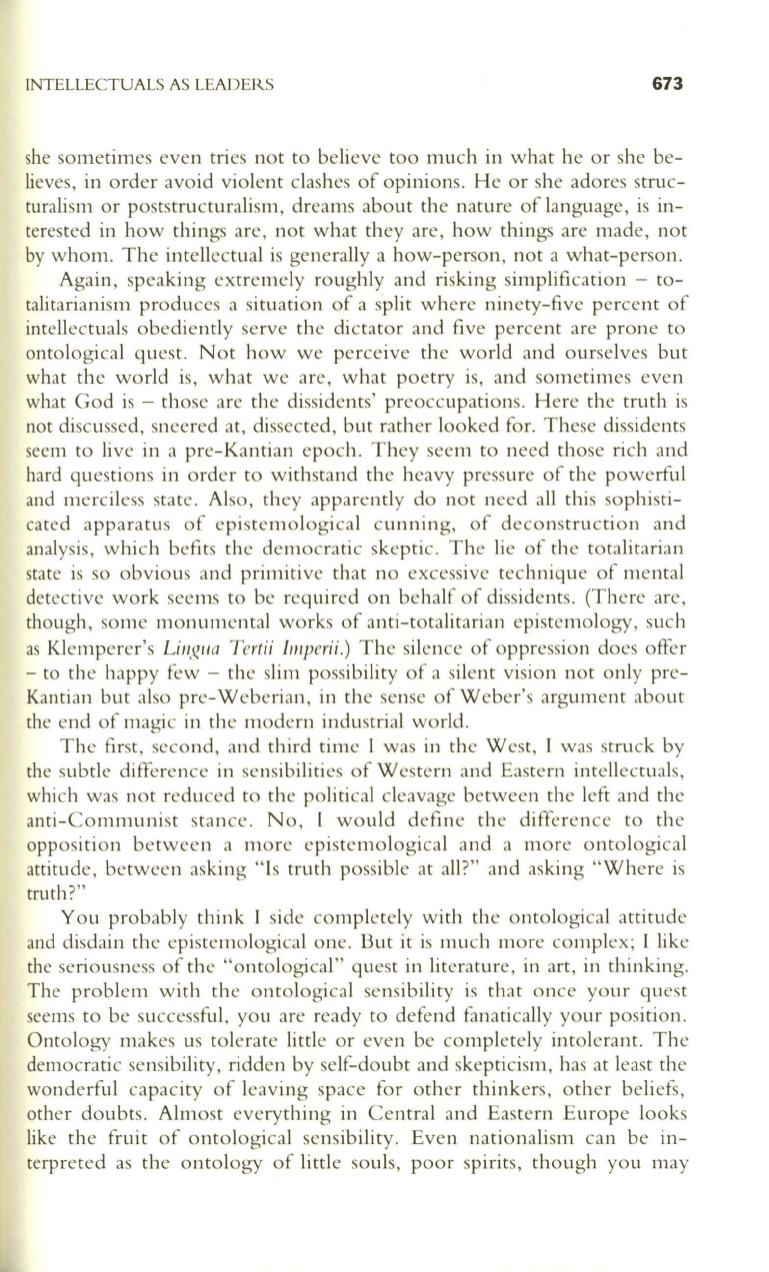
INTELLECTUALS AS LEADER.S
673
she sometimes even tries not to believe too much in what he or she be–
lieves, in order avoid violent clashes of opinions. He or she adores struc–
turalism or poststructuralism, dreams about the nature of language, is in–
terested in how things are, not what they are, how things are made, not
by whom. The intellectual is generally a how-person, not a what-person.
Again, speaking extremely roughly and risking simplification - to–
talitarianism produces a situation of a split where ninety-five percent of
intellectuals obediently serve the dictator and five percent are prone to
ontological quest. Not how we perceive the world and ourselves but
what the world is, what we are, what poetry is, and sometimes even
what God is - those are the dissidents' preoccupations. Here the truth is
not discussed, sneered at, dissected, but rather looked for. These dissidents
seem to live in a pre-Kantian epoch. They seem to need those rich and
hard questions in order to withstand the heavy pressure of the powerful
and merciless state. Also, they apparently do not need all this sophisti–
cated apparatus of epistemological cunning, of deconstruction and
analysis, which befits the democratic skeptic. The lie of the totalitarian
state is so obvious and primitive that no excessive technique of mental
detective work seems to be required on behalf of dissidents. (There are,
though, some monumental works of anti-totalitarian epistemology, such
as Klemperer's
Lil'lgua Tertii Imperii.)
The silence of oppression does offer
- to the happy few - the slim possibility of a silent vision not only pre–
Kantian but also pre-Weberian, in the sense of Weber's argument about
the end of magic in the modern industrial world.
The first, second, and third time I was in the West, I was struck by
the subtle difference in sensibilities of Western and Eastern intellectuals,
which was not reduced to the political cleavage between the left and the
anti-Communist stance. No, I would define the difference
to
the
opposition between a more epistemological and a more ontological
attitude, between asking "Is truth possible at all?" and asking "Where is
truth?"
You probably think I side completely with the ontological attitude
and disdain the epistemological one. But it is much more complex; I like
the seriousness of the "ontological" quest in literature, in art, in thinking.
The problem with the ontological sensibility is that once your quest
seems to be successful, you are ready to defend fanatically your position.
Ontology makes us tolerate little or even be completely intolerant. The
democratic sensibility, ridden by self-doubt and skepticism, has at least the
wonderful capacity of leaving space for other thinkers, other beliefs,
other doubts. Almost everything in Central and Eastern Europe looks
like the fruit of ontological sensibility. Even nationalism can be in–
terpreted as the ontology of little souls, poor spirits, though you may


